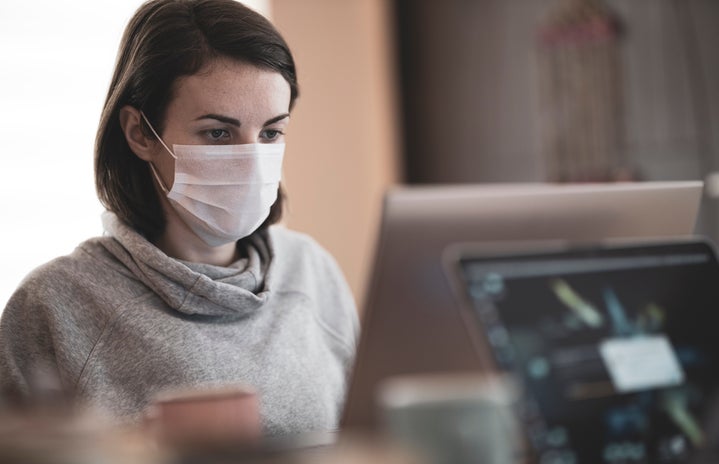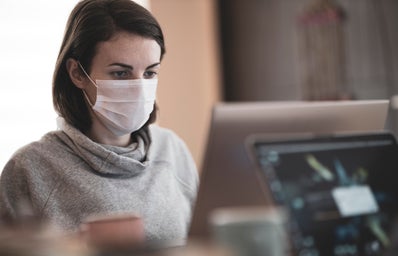I did everything right. And it happened anyway.
Sure, I experienced the body aches, the fatigue, and the distinctive “covid headache” that was unlike any headache I’ve had before or since (if you know, you know). I still have scars on my hands from the virus-inflicted rash that I mistook for an allergic reaction, before I knew I was sick. But the physical symptoms weren’t even the half of it. And I have a feeling that the emotional scars — much like the physical ones — will long outlast my two weeks spent in isolation. Naturally, I had a lot of feelings after being diagnosed with COVID-19 last November — feelings that were foreign to me and with which I didn’t know how to cope. Feelings that I really really wanted to talk about… but that I didn’t because I was ashamed. At the time, it seemed unmentionable that I had COVID-19. So, as one does, I decided to write about my journey and post it online for the world to see. Initially, I was hesitant to write an article telling people not to blame themselves for contracting COVID-19. I was afraid that it would be “sending the wrong message” … and I have to admit that I still kind of am. But this article is not meant to negate the importance of preventative measures in limiting the spread of the virus (which I both practise and endorse). Rather, the intent of this article is to address the silent risk of self-stigmatization.

My journey with COVID-19 began on a Monday night with a sore throat and the premonition that something was off. At first I resisted the idea of getting tested. I had followed the guidelines. I had no known high-risk contacts (I barely had contacts period — I live with my parents and only leave the house to go to work). I had done everything right. And perhaps even more than that, I didn’t want my worst fear to come true. I hoped that my intuition was wrong. But if I’ve learned anything through this process, it’s that simply not wanting to contract COVID-19 doesn’t mean that it won’t happen.
When I did go to the testing centre, a sign that read “no photos” marked the entrance to a big white tent. As if I would want to take a photo, I remember thinking. I hoped that I wouldn’t see anyone I knew. Waiting to get tested, I realized that once I left that tent, I would officially become a “suspected case of COVID-19.” A suspect. It felt like I was being investigated for murder — which in a way I guessed I kind of was; I had no way of knowing who the virus would spread to after me. I hoped they would live. But I also knew that maybe they wouldn’t.

49 hours later (yes, I had been counting), I got the call I had been dreading. I braced myself as the doctor said the sentence that I least wanted to hear: “Your test came back positive; that means that you do have COVID.” She had a friendly voice, but all I could think was that after months and months of resisting, I had finally given in. I felt dirty, like I had signed on as an accomplice to this awful virus. At the same time, it was like I had become nothing more than another statistic, another case to be added to the hundreds of thousands before me. It’s a funny thing, testing positive for COVID-19 after worrying about it for almost a year; at first you’re scared of everything, and then, once you think you’ve figured it out you get sick… and then you don’t know anything anymore. Part of you looks for someone to blame. But since you’re not an epidemiologist, you can’t figure it out (even the best epidemiologists have yet to fully understand this virus). Ultimately, you just end up blaming yourself, and you assume that everyone else is blaming you too.
While fighting the awful and bizarre array of physical symptoms, I also struggled with some of the lesser-known evils of COVID-19: anxiety, guilt, and self-doubt. My fear of negative perception was debilitating. When I completed my contact tracing, the nurse asked me if I wanted to remain confidential to my high-risk contacts. I hadn’t considered it previously, but her asking made me wonder if maybe I did have something to hide. The sense of secrecy worsened my anxiety about stigmatization. I only told two friends about my diagnosis (in addition to the people I was required to tell by Public Health, of course). I was scared of losing friendships and I thought that everyone would hate me. I feared communicating my test result to my employer because I was convinced that people would think it was “my fault” if there was an outbreak. I imagined stories in newspapers about a villainized employee who had spread the disease to unsuspecting customers. I worried that my coworkers would be mad at me for giving it to them. I knew that Public Health would have to conduct investigations. I pictured yellow police tape sequestering my workplace. During my conversations with Public Health and my boss it felt like everyone was blaming me, when really, they were just trying to gather the facts. Although it was completely unfounded, I was anxious that I would lose my job. Many institutions warn against the dangers of stigmatizing COVID-19, but the self-stigmatization I had created was way worse than any external stigma I would face.

When my case had been resolved and I was no longer required to self-isolate, I was nervous to leave the house. I was scared to be around people again — two weeks in quarantine had conditioned me to see myself as a threat. I had to remind myself that self-isolation isn’t a punishment; it’s simply what is necessary to keep people safe. Staying inside once I was no longer contagious wasn’t going to help anyone, but I told myself that it was what I “deserved.”
Now that I’ve resumed living my normal-ish life (although nothing about life seems “normal” these days), I’m trying to figure this whole thing out. Time and time again, we have heard that “diseases don’t discriminate; people do.” And I think that most of us have come to understand that when it comes to conditions like HIV-AIDS and certain mental illnesses. But the story is a little different when it comes to the coronavirus. We are constantly bombarded with news stories about what happens when people don’t follow the Public Health guidelines, and about COVID-deniers, and about people that whistleblowers dub “covidiots.” On some level, it can be reassuring to assume that everyone who contracts the virus “just wasn’t careful enough” or did something wrong. It took testing positive myself to realize that I had been calming my fear of the disease by assuming that all people who acquire COVID-19 get sick because of mistakes they’ve made. Now I realize that you can still get sick, no matter how careful you are. So, I guess the moral of the story is that sometimes, even if we do everything we can, it still isn’t enough (sorry, I know that’s a depressing moral).




